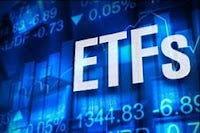Top 25 ETF's Last Week

I did a quick scan of the top performing ETF's last week (Top 25) and wanted to share this information with you - not necessarily as recommended investments, since many of these are inverse and / or highly leveraged, carry a considerable amount of risk and are generally speculative in nature (i.e., "trading" vs "investing"). Instead, I thought it would be interesting to see the themes and trends that are emerging in the markets. In particular, what sectors have been performing poorly (as demonstrated by the out-performance of the inverse ETF's that track the underlying indices). 3x Inverse Natural Gas is top of the list (DGAZ) with a 41% return last week, followed by Inverse US Treasury ETN (TAPR) with a 34% return, US Big Banks Index 3x Inverse Leveraged ETN (BNKD) with a 29% return, the Real Estate Bear 3x (DRV) with a 28% return and again a Natural Gas Short (KOLD) with a 26% return, rounds out the top 5.
Here's the Top 25 ETF list for last week:

What's not surprising to see is long silver and gold funds (3 funds or 12%), short oil and gas funds (7 funds or 28%) and short banks (4 funds or 16%). Precious metals have been performing well with all the government stimulus and monetary easing recently and fears of deflation followed by major inflation. Also, the recession's impact on the economy and dramatically reduced demand for energy and the impact of very low interest rates and the economic disruption on financial services companies are also well understood. There are 7 funds (28%) that short various stock market indices, which is also not too surprising given the recent stock market volatility and popularity of "shorting the index." One semiconductor short and one US Treasury short round out the mix and again, not too surprising given recent market action in the wake of the COVID-19 pandemic and onset of a recession.
What is surprising is that there are two real estate short funds on the list (8% of the total). Typically in a recession, real estate is considered a defensive play, but in this recession due to massive impact the pandemic has had on almost every type of real estate asset, there are expectations that real estate values will plummet more broadly and perhaps worse than during the Great Recession.
Lodging / Resorts (YTD Return -45.81%) Many hotels have closed due to lack of travel resulting from the pandemic. As the country reopens and travel slowly resumes, social distancing measures will make the process very slow and some hotels may never reopen or if they do, it could be years before they are profitable. It's hard to imagine business travel will quickly return to normal due to the cost and difficulty of travel (many companies have been forced to cut back expenses in the wake of the recession) and also the ability to conduct remote video conferences to accomplish the same tasks. Even leisure travel could take some time to come back (no doubt some travelers will be lured by low prices).
Retail (YTD Return -41.16%) For retail, tenants are going out of business and those that remain (other than the "essential businesses" like hardware stores, grocery stores, etc. who have been doing quite well recently) will struggle to pay their rent. There have also been many high-profile retail bankruptcies recently, most recently J. Crew, Neiman Marcus and JC Penney and many more retailers are in jeopardy. All of these bankruptcies mean lots of empty spaces at shopping centers and malls, which will make it very hard for property owners to cover their expenses including paying the mortgage.
Office (YTD Return -22.63%) In the office sector, there are similar issues with tenants who are going out of business and / or are struggling to pay rent. What's more important, however, is the longer term trend that many companies may have much of their workforce work from home if not all of the time at least part of the time. Indeed, many tech companies such as Google, Twitter, Amazon, Facebook, Microsoft, Slack and Zillow have already allowed an extended period of time for employees to work from home, some until the end of 2020 and for Twitter, "permanently." If this trend continues, it could dramatically reduce demand for office space in the future which could again put pressure on property owners being able to cover expenses.
Residential (YTD Return -18.05%) Even residential real estate is facing challenges with tenants still paying rent, but struggling and without a rebound in job growth or continued government assistance in the form of unemployment benefits and stimulus checks, paying the rent will only get more difficult over time. Landlords will not be able to evict for many months due to recent eviction moratorium legislation at the federal, state and local levels. Landlords could face a large number of non-paying tenants building up over time. However, it's clear that the residential space is performing the best right now.
For more information on real estate sector performance check out NAREIT's website here.
Legendary investor Carl Icahn is "short commercial real estate" and says he hasn't seen this good of a risk/reward opportunity in many years. This is a little scary, since many investors view real estate and the relatively high, steady yields produced as safe. Indeed, many sellers of commercial mortgage fund products tout their relative safety and yield compared to US Treasuries, which clearly is not the case in this recession. Mortgage REITs are down -47.61% year to date, with home financing (-49.1%) performing slightly worse than commercial financing (-44.3%)
I hope you find this post useful as you chart your personal financial course and Build a Financial Fortress in 2020. Stay safe, healthy and positive.
To see all my books on investing and leadership, click here.
Disclaimer: I use affiliate links where I get paid a small amount if you buy the service or product. This helps support my blog.



